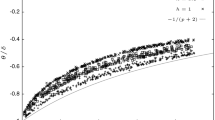Abstract
We investigate the use of fractional powers of the Laplacian for signal and image simplification. We focus both on their corresponding variational techniques and parabolic pseudodifferential equations. We perform a detailed study of the regularisation properties of energy functionals, where the smoothness term consists of various linear combinations of fractional derivatives. The associated parabolic pseudodifferential equations with constant coefficients are providing the link to linear scale-space theory. These encompass the well-known α-scale-spaces, even those with parameter values α > 1 known to violate common maximum-minimum principles. Nevertheless, we show that it is possible to construct positivity-preserving combinations of high and low-order filters. Numerical experiments in this direction indicate that non-integral orders play an essential role in this construction. The paper reveals the close relation between continuous and semi-discrete filters, and by that helps to facilitate efficient implementations. In additional numerical experiments we compare the variance decay rates for white noise and edge signals through the action of different filter classes.
Preview
Unable to display preview. Download preview PDF.
Similar content being viewed by others
References
Witkin, A.P.: Scale-space filtering. In: Proc. Eighth International Joint Conference on Artificial Intelligence, Karlsruhe, West Germany, vol. 2, pp. 945–951 (1983)
Koenderink, J.J.: The structure of images. Biological Cybernetics 50, 363–370 (1984)
Lindeberg, T.: Scale-Space Theory in Computer Vision. Kluwer, Boston (1994)
Florack, L.: Image Structure. Computational Imaging and Vision, vol. 10. Kluwer, Dordrecht (1997)
Sporring, J., Nielsen, M., Florack, L., Johansen, P. (eds.): Gaussian Scale-Space Theory. Computational Imaging and Vision, vol. 8. Kluwer, Dordrecht (1997)
Iijima, T.: Basic theory on normalization of pattern (in case of typical one-dimensional pattern). Bulletin of the Electrotechnical Laboratory 26, 368–388 (1962) (in Japanese)
Iijima, T.: Theory of pattern recognition. Electronics and Communications in Japan, 123–124 (1963) (in English)
Pauwels, E.J., Van Gool, L.J., Fiddelaers, P., Moons, T.: An extended class of scale-invariant and recursive scale space filters. IEEE Transactions on Pattern Analysis and Machine Intelligence 17, 691–701 (1995)
Duits, R., Florack, L., de Graaf, J., Ter Haar Romeny, B.: On the axioms of scale space theory. Journal of Mathematical Imaging and Vision 20, 267–298 (2004)
Felsberg, M., Sommer, G.: Scale-adaptive filtering derived from the laplace equation. In: Radig, B., Florczyk, S. (eds.) Pattern Recognition. LNCS, vol. 2032, pp. 95–106. Springer, Heidelberg (2001)
Rudin, W.: Real and Complex Analysis, 3rd edn. McGraw-Hill, New York (1986)
Taylor, M.E.: Partial Differential Equations I – Basic Theory. Springer, New York (1996)
Taylor, M.E.: Partial Differential Equations II – Qualitative Studies of Linear Equations. Springer, New York (1996)
Taylor, M.E.: Pseudodifferential Operators. Princeton University Press, Princeton (1981)
Nielsen, M., Florack, L., Deriche, R.: Regularization, scale-space and edge detection filters. Journal of Mathematical Imaging and Vision 7, 291–307 (1997)
Scherzer, O., Weickert, J.: Relations between regularization and diffusion filtering. Journal of Mathematical Imaging and Vision 12, 43–63 (2000)
Author information
Authors and Affiliations
Editor information
Editors and Affiliations
Rights and permissions
Copyright information
© 2005 Springer-Verlag Berlin Heidelberg
About this paper
Cite this paper
Didas, S., Burgeth, B., Imiya, A., Weickert, J. (2005). Regularity and Scale-Space Properties of Fractional High Order Linear Filtering. In: Kimmel, R., Sochen, N.A., Weickert, J. (eds) Scale Space and PDE Methods in Computer Vision. Scale-Space 2005. Lecture Notes in Computer Science, vol 3459. Springer, Berlin, Heidelberg. https://doi.org/10.1007/11408031_2
Download citation
DOI: https://doi.org/10.1007/11408031_2
Publisher Name: Springer, Berlin, Heidelberg
Print ISBN: 978-3-540-25547-5
Online ISBN: 978-3-540-32012-8
eBook Packages: Computer ScienceComputer Science (R0)




